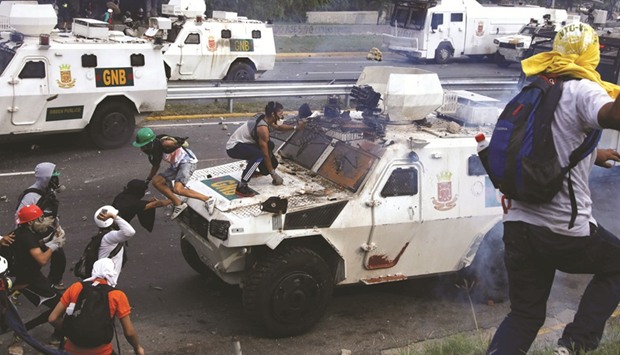Venezuelan President Nicolas Maduro’s call for a new constitution to quell a deadly political crisis inflamed his opponents, who blocked roads and banged pots yesterday to demand elections.
Maduro said his move was necessary to fend off what he says is an attempted foreign-backed “coup” against him.
His opponents say it further weakens the chances of holding a vote to remove Maduro, whom they blame for an economic crisis that has sparked food shortages and rioting.
Analysts said the socialist president was playing for time and looking to delay presidential elections due next year.
“This escalates the crisis to unprecedented levels.
It increases tensions,” said Diego Moya-Ocampos, a Venezuelan analyst at London-based consultancy IHS Markit Country Risk.
“If protests do get out of hand it opens the door for Maduro’s powerful ally, the armed forces, to demand the constitution be respected or take over power to supervise a transition.”
The opposition is demanding early elections to replace the socialist president.
Maduro instead said he was invoking his power to create a 500-member “constituent assembly” to rewrite the constitution.
That would cut out other political parties and the opposition-controlled Congress.
Maduro regularly portrays Venezuela as the victim of a US-led capitalist conspiracy.
The opposition complained that the body drafting the new charter would not be the result of a popular election.
Maduro said it would be composed of workers and farmers, constituencies that form his party’s traditional base of support.
It will be “a citizen’s constituent body, not from political parties — a people’s constituent body,” he said.
He said the National Electoral Council would start work on the process on Tuesday.
Maduro was elected in 2013 to succeed his late mentor Hugo Chavez.
Their government had won the affection of many through social welfare programmes.
Maduro’s popularity has since dropped sharply, as falling prices for Venezuela’s crucial oil exports have slashed the state’s revenues.
Venezuelans are suffering shortages of food, baby milk, medicine and other basic supplies.
The International Monetary Fund estimates inflation in Venezuela will hit 720% this year.
Maduro has resisted repeated opposition efforts to hold a vote on removing him from power.
The next presidential elections are due at the end of next year.
Under Venezuelan law the constituent assembly’s decisions would overrule any other state institution.
Political analyst Nicmer Evans said that with his new proposal Maduro is “playing for time at all cost, in order to stay in power”.
“The pro-Chavez movement is convening the only kind of election it can win by manipulating the way voting is held,” said Eugenio Martinez, an analyst who specializes in elections.
Angry protesters hit the streets early yesterday in renewed rallies.
Reporters saw streets blocked with makeshift barricades of rubbish and pulled-down trees as people banged pots and blew horns.
“This constituent assembly that Maduro has announced is a manipulation to escape elections,” said student Raul Hernandez, 22, one of about 100 people blocking a major avenue in eastern Caracas.
Maduro made his announcement to thousands of supporters who rallied for a May Day demo on Monday.
Elsewhere security forces sprayed tear gas and water cannon at anti-government demonstrators, the latest in more than a month of clashes.
Opposition leaders called for a “mega protest” for today.
“People, into the streets!” opposition leader Henrique Capriles said on Twitter. “You must disobey such lunacy!”
General Motors Co said yesterday it would take a charge of up to $100mn after a judge ordered the seizure of its plant in Valencia last month, a move that prompted the halting of its operations in Venezuela.
The largest US automaker said it was deconsolidating its business in the country following the seizure of its Valencia plant on April 18 by judicial authorities, which led GM to fire 2,700 workers.
The plant had not produced a car since the beginning of 2016 because of parts shortages and strict currency controls.
GM, the market leader in Venezuela for 35 years, said executives have expressed a willingness “to talk with government officials and union leaders about the circumstances under which it could be possible to start production and employ some number of workers with a new, viable business model.”
Total auto production in Venezuela fell to a historic low of 2,849 cars in 2016, about 75% less than the year before, according to Venezuela’s automotive industry group. In the first two months of 2017, total Venezuelan auto production was just 240 vehicles, down 50% over the same period last year.
Declining auto production comes amid rising protests.
On Tuesday, Venezuela’s opposition was blocking streets to decry unpopular leftist President Nicolas Maduro’s decision to create a new super-body known as a “constituent assembly,” a move they say is a veiled attempt to cling to power by avoiding elections.
Venezuela’s car industry has been hit by a lack of raw materials stemming from complex currency controls.
Nearly all vehicles built in Venezuela in the first two months this year were assembled by Toyota Motor Corp, which said last month its plant was operating normally. But the company said it was “only producing based on orders that come in”.
In early 2015, Ford Motor Co wrote off its investment in Venezuela when it took an $800mn pretax writedown. The company does not currently produce vehicles in Venezuela.

Demonstrators in Caracas, Venezuela.
